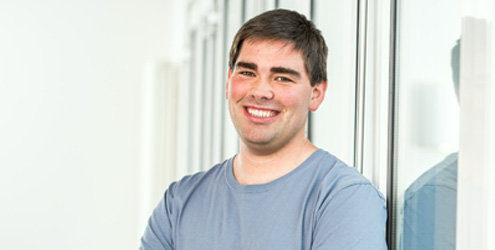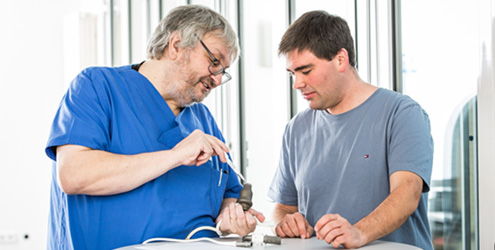"I finally heard and felt my heart again"
Alexander Wihler is 20 years old when his heart becomes weaker and weaker. Then his organs fail and he falls into a coma. The team of doctors led by cardiac surgeon Prof. Dr. Friedhelm Beyersdorf at the University Heart Center Freiburg - Bad Krozingen must act immediately to save his life.

Working in the vineyard every day is exhausting, without question. But his increasing respiratory problems were a cause for concern for winegrower Alexander Wihler. It was early 2013 when he went to his family doctor complaining of dizziness, shortness of breath and vision problems. Low blood pressure was the first diagnosis. But because there was no improvement despite medication, he went to see a cardiologist. He diagnosed a significantly enlarged left ventricle and referred Alexander Wihler to the University Heart Center in Freiburg, 25 kilometers away. "Here came the shocking diagnosis. My heart was so damaged that I needed a donor heart." The reason was previously unrecognized congenital heart failure - a shock for him and his family. More than a thousand people in Germany are currently waiting for a donor heart. But not even a third of these patients have the chance to receive a new heart every year.
Back at his parents' farm near the French border, Alexander's problems worsened: "I could only sleep sitting up, had trouble eating and drinking and water began to collect in my lungs." He was admitted to the University Heart Center and immediately placed on the urgent waiting list for a heart transplant. Despite this, the waiting time for a donor heart in Germany at the highest urgency level is several months - a long time that Alexander did not have. His condition increasingly deteriorated. He developed severe pneumonia, his liver and kidneys failed and he fell into a coma. "We had to act immediately and implant a left ventricular assist device (an artificial heart) in an emergency operation," explains Dr. Michael Berchtold-Herz. The operation saved his life, but he lost his place on the high-priority list. Due to a blood clot in the heart support system and a new problem with a heart valve, he had to be operated on again three weeks later. The support system was replaced and the diseased heart valve repaired. After that, things slowly improved step by step and Alexander spent two months in the cardiac surgery intensive care unit. "When I woke up from my coma, I first had to come to terms with the fact that I was now living with a pump. I could no longer hear my heart beating," recalls Alexander. Cables led from his stomach to a bag containing the battery. From then on, he always had to carry this with him.

Alexander had been living with his artificial heart for two years when the pump stopped briefly one night in August 2015. The doctors and cardiotechnicians at the University Heart Center discovered a cable break and fitted the now 22-year-old with a special bridging cable. "With his previous history, replacing the ventricular assist device again was not the optimal treatment," says Dr. Berchtold-Herz. "This meant that we had to put Alexander back on the high urgency list for a donor heart. As there was a permanent risk that the ventricular assist device could stop working, he had to stay at the University Heart Center until the heart transplant." In hindsight, the cable break was his good fortune, says Alexander.
But he had to wait five months - until February 1, 2016, when the long-awaited call came at 9.30 p.m.: "Dr. Berchtold-Herz called from his vacation and said the organ was there and it would be ready right away. I didn't know whether to cry or laugh with joy." Now everything had to happen quickly. He was prepared for the operation within an hour. He went through the operating theater at 10.30 pm. The team led by the two senior physicians Dr. Kerstin Brehm and Dr. Johannes Kroll operated for nine hours. The pump could not be easily removed due to severe adhesions. It had to be painstakingly and painstakingly dissected free. The team did not have much time, as the new heart had to be transplanted as quickly as possible. When it was implanted, it was weakened. But the operation was a success. Alexander's new heart started beating.
A few hours after the transplant, however, it became apparent that the new heart was not yet able to maintain Alexander's circulation. He had to be reconnected to the heart-lung machine. This gave the new heart additional time to recover until the heart-lung machine could finally be removed after five days.
He remained in an induced coma for another week. "It was a good feeling to wake up. The bag and the pump were gone. No cables, just the accesses for the infusion." And most importantly: "I could finally hear and feel my heart again, just like three years ago."
Today, Alexander lives almost like he used to, he can cycle, jog and go out with his friends in the evenings. "Without the possibilities of high-performance university medicine, Alexander would not have survived," says the heart surgeon looking back. "This was a severe clinical picture that was complicated by many subsequent problems: severe heart failure, pneumonia, multiple organ failure, the emergency implantation of a ventricular assist device, then the technical defect, the wait for the new heart and finally the difficult heart transplant, which also involved primary graft failure. We had to exhaust all the possibilities of university medicine. Many other clinics, departments and institutes at the University Heart Center Freiburg - Bad Krozingen and the University Hospital Freiburg played their part in Alexander's successful treatment. Only through the joint and interdisciplinary work of the experts from the various medical fields - cardiac surgery, anesthesia, cardiology, nephrology, cardiotechnology, medical microbiology, transplant immunology - was it possible to overcome the complex challenges that were required in Alexander's treatment. It is all the more wonderful to see that he is now leading a normal life again." Around 15 - 20 heart transplants are performed at the University Heart Center every year.
Corporate Communications
Breisacher Straße 153
79110 Freiburg
Phone: 0761 270-84830
Fax: 0761 270-9619030
kommunikation@uniklinik-freiburg.de

